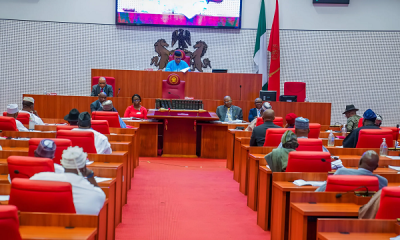Special Features
The Guardians Within: How State Police Can Transform Nigeria’s Security Landscape

Despite the abundant resources and vibrant population that characterize the Nigerian landscape, the age-old monster of insecurity continues to raise its ugly head. Security challenges cast a long, haunting shadow over the nation’s dreams.
Amidst the fiery grip of insurgency in the Northeast, and the haunting echoes of reprisals on the Plateau, Nigerians find their safety in jeopardy. As the Northwest and central suffers from perennial bandit attacks,the menacing presence of enigmatic gunmen and kidnappers continue to wreck havoc across the Niger. Throughout the nation, a perpetual threat looms, casting shadows on the well-being of its resilient people.
With the recent appointments of new service chiefs by President Bola Tinubu, Nigerians anticipate with a hopeful gaze that the disturbing security challenges will soon dissipate. Yet, history serves as a stern teacher, reminding us that mere reliance on the service chiefs to put and end to the vicious cycle of killings and violence would be a repetition of past mistakes; doing the same thing and expecting different results.
Now, more than ever, we must think outside the box and chart a new course where innovations meet necessity. Among these, the establishment of state police stands out as a potential game-changer, deserving careful consideration.
Current Security Architecture
The current federal security architecture in Nigeria, centered on the Nigeria Police Force as the primary law enforcement agency, has proven inadequate in combating security threats across the country. Limited resources, inadequate personnel, bureaucratic constraints among others have hindered the force’s ability to provide swift and effective responses to security incidents.
The Nigeria Police Force’s efforts to combat security challenges have been lackluster, evident in the surging rates of crime and violence across the nation. The force’s centralized structure impairs swift decision-making and timely responses to localized security threats.
Oftentimes, criminal cases that fall within the jurisdiction of the federating units are unnecessarily transferred to the IGP’s office in Abuja for considerations. This results in undue delays and hampers the timely dispensation of justice, which is a significant concern.
Decentralization For Swift Response
Making the state police step into the spotlight, embracing the authority to protect and serve is like granting each state its own armor, tailor-made to fit the contours of its unique challenges. With this transformation, they become the vigilant guardians, ever-ready to face the storms that may arise within their own borders.
With state police forces donning their individual colors, they embrace the freedom to choreograph their own law enforcement, no longer bound by a one-size-fits-all approach. Decentralization opens the doors to efficient resource allocation and better intelligence gathering. It makes for officers to step forward as local experts, deeply connected to their surroundings.
Addressing Concerns Of Abuse Of Power
Critics of state police often raise concerns about potential abuse of power or political interference especially by state governors. However, proper checks and balances can be put in place to safeguard against such abuses.
To ensure the independence and professionalism of state police forces, robust oversight mechanisms can be established. Independent review boards, composed of representatives from civil society and non-partisan agencies, can be empowered to investigate and address any reports of misconduct or abuse of power. Additionally, adherence to strict standard operating procedures and human rights-focused training programs will emphasize respect for citizens’ rights and prevent the misuse of authority.
Enhancing Community Policing
The establishment of state police would enhance community policing efforts, fostering a closer relationship between law enforcement officers and the communities they serve. These local enforcers would immerse themselves in their territories, attuned to the unique beats of security challenges cross their landscapes.In the warmth of strengthened kinship, trust, knowledge, and vigilance come alive, fostering a deep connection for the benefits of security agents and the people they serve.
Community policing emphasizes collaboration between law enforcement and local communities. State police officers, being familiar faces within their communities, can gain valuable insights from residents and develop a deeper understanding of the specific security issues affecting them. By involving citizens in crime prevention efforts, state police can build trust, reduce crime and strengthen social cohesion.
Promoting Job Creation and Economic Development
State police can also contribute to job creation and economic development within states, as recruitment and training of personnel would require local resources and expertise. This process can create employment opportunities for unemployed graduates in their respective states, thereby reducing unemployment rates and stimulating economic growth. Additionally, the establishment of training academies for state police officers can spur the growth of educational institutions and related industries
Crime Prevention,Control And Healthy Competition
State police systems enhance crime prevention and control by holding individual states accountable for their crime rates and public safety outcomes. This accountability will drive states to develop innovative strategies and tailored approaches to effectively address their specific crime challenges.
Successful efforts in curbing crime and maintaining public safety can make states more attractive to investments, businesses, and tourists, contributing to economic growth and development. This dynamic creates a strong motivation for states to outperform each other in ensuring law and order within their territories.
Likewise, states can compare the performance of their law enforcement agencies with others, allowing them to identify successful practices and strategies. By learning from each other’s experiences, law enforcement agencies can enhance their effectiveness and efficiency in combating crime.
Promoting Political Accountability
Implementing state police will help promote political accountability at the state level. As state governors become directly responsible for the performance of their police forces, political leaders are motivated to demonstrate effective governance and implement robust security measures to gain and maintain public trust.
The desire to uphold a positive reputation and deliver on electoral promises related to law and order can foster improved service delivery and enhancement of overall security measures.
Conclusion
In conclusion, the establishment of state police in Nigeria is a crucial step towards achieving the much-needed restructuring of our security apparatus. By decentralizing law enforcement powers and empowering state governments to address security concerns within their jurisdictions, state police forces can provide a more responsive and effective security apparatus.
As an administration that came into office with a Renewed Hope mantra, President Bola Tinubu has a unique opportunity to champion this cause as state police offers Nigeria a potential path towards instilling greater confidence in its citizens and fostering an environment conducive to sustainable development.
With the right mechanisms in place to address concerns of abuse of power and ensure proper coordination, state police can significantly contribute to a safer and more prosperous Nigeria.
Advertise or Publish a Story on EkoHot Blog:
Kindly contact us at ekohotblog@gmail.com. Breaking stories should be sent to the above email and substantiated with pictorial evidence.
Citizen journalists will receive a token as data incentive.
Call or Whatsapp: 0803 561 7233, 0703 414 5611


















